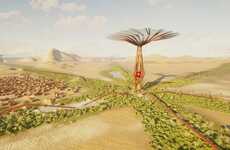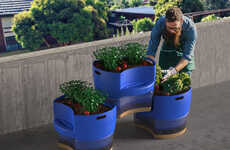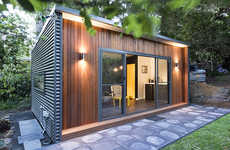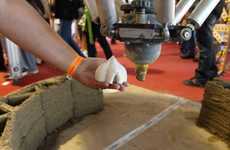
The Organic London Skyscraper Grows Out of Recycled Waste
Meghan Young — September 25, 2014 — Eco
References: chartier-corbasson.tumblr & gizmag
As far as eco-friendly skyscrapers go, the Organic London Skyscraper is a concept that might have them all beat. It essentially grows in height over time based on the recycled materials of the residents. Discarded paper and plastic would be used to create panels for its continued construction, making the process quite innovative and unique.
Designed by Chartier-Corbasson, the eco-friendly skyscraper will collect and sort the waste materials within the building to cut down costs and make cash-flow more manageable. Since the eco-friendly skyscraper relies on its residents, the quicker vacant spots are snatched up, the faster the building grows to its full potential. Self-regulating, the structure itself is quite captivating. It is inspired by the bamboo scaffolding used in Asia.
Designed by Chartier-Corbasson, the eco-friendly skyscraper will collect and sort the waste materials within the building to cut down costs and make cash-flow more manageable. Since the eco-friendly skyscraper relies on its residents, the quicker vacant spots are snatched up, the faster the building grows to its full potential. Self-regulating, the structure itself is quite captivating. It is inspired by the bamboo scaffolding used in Asia.
Trend Themes
1. Eco-friendly Construction - The trend towards using recycled materials for construction purposes presents disruptive innovation opportunities in the building industry.
2. Self-sustaining Buildings - The concept of buildings that collect and sort waste materials to fuel their own growth offers opportunities for disruptive innovation in sustainable architecture.
3. Community-driven Skyscrapers - The idea of skyscrapers growing in height based on resident participation opens up possibilities for disruptive innovation in urban development and housing.
Industry Implications
1. Construction - The construction industry can explore using recycled materials and innovative waste management systems to create more eco-friendly buildings.
2. Architecture - Architects can design self-sustaining buildings that integrate waste sorting and recycling systems, revolutionizing the way structures interact with the surrounding environment.
3. Real Estate - Real estate professionals can embrace the concept of community-driven skyscrapers to create a unique selling point and attract environmentally conscious residents.
4.8
Score
Popularity
Activity
Freshness























